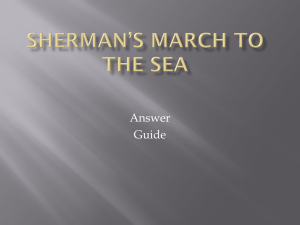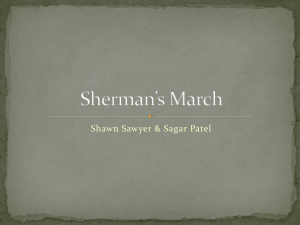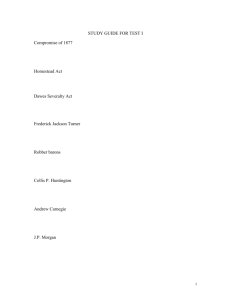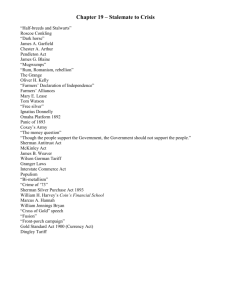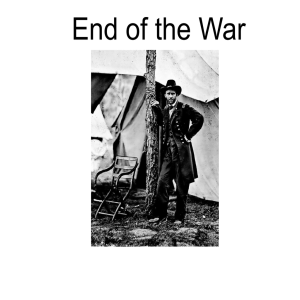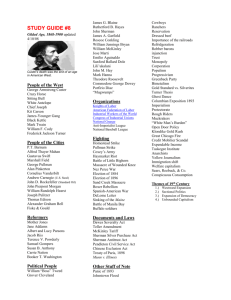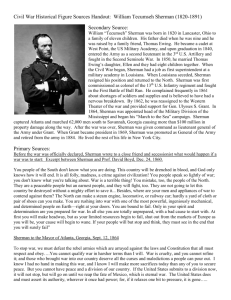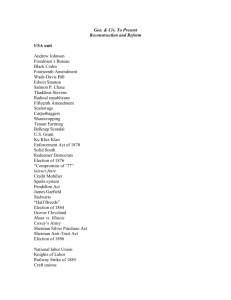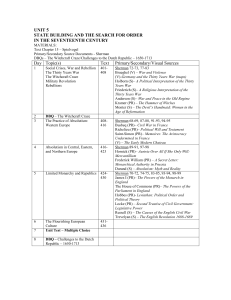Class Handouts - Mrs. Wilcoxson
advertisement
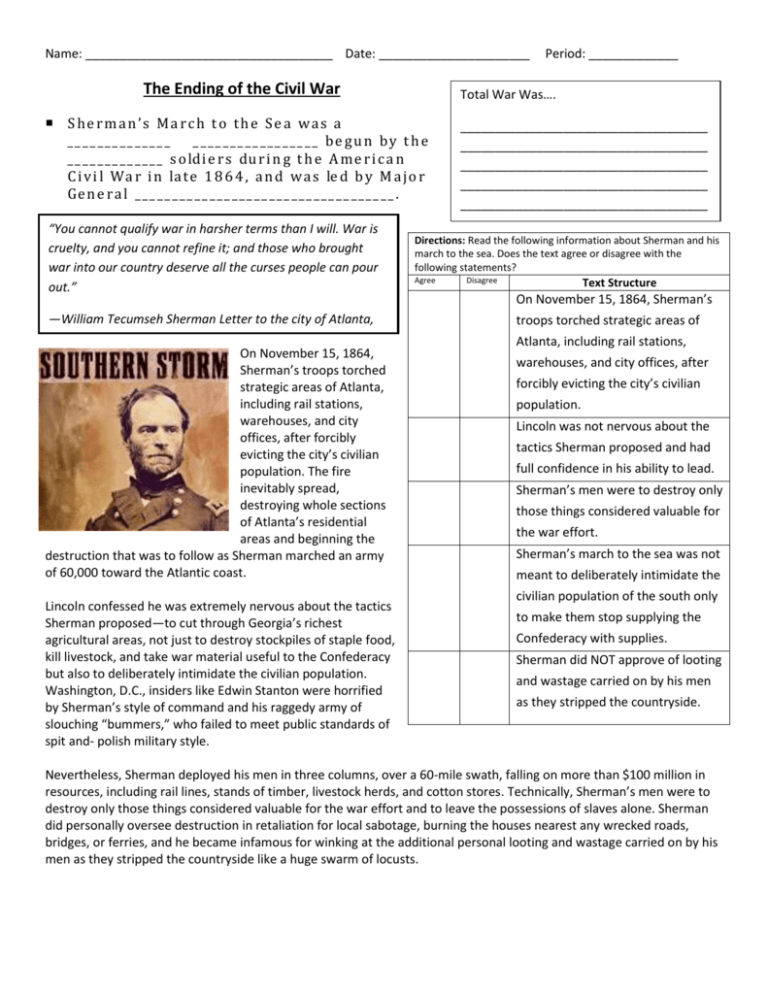
Name: ____________________________________ Date: ______________________ The Ending of the Civil War Total War Was…. S herman’s March to the Sea was a ______________ _________________ begun by the _ _ _ _ _ _ _ _ _ _ _ _ _ s o ldi e r s du r i n g t h e A m e r i c a n C i v i l Wa r i n la t e 1 8 6 4 , a n d w a s le d b y M a j o r Ge n e r a l _ _ _ _ _ _ _ _ _ _ _ _ _ _ _ _ _ _ _ _ _ _ _ _ _ _ _ _ _ _ _ _ _ _ _ . “You cannot qualify war in harsher terms than I will. War is cruelty, and you cannot refine it; and those who brought war into our country deserve all the curses people can pour out.” —William Tecumseh Sherman Letter to the city of Atlanta, 1864 On November 15, 1864, Sherman’s troops torched strategic areas of Atlanta, including rail stations, warehouses, and city offices, after forcibly evicting the city’s civilian population. The fire inevitably spread, destroying whole sections of Atlanta’s residential areas and beginning the destruction that was to follow as Sherman marched an army of 60,000 toward the Atlantic coast. Lincoln confessed he was extremely nervous about the tactics Sherman proposed—to cut through Georgia’s richest agricultural areas, not just to destroy stockpiles of staple food, kill livestock, and take war material useful to the Confederacy but also to deliberately intimidate the civilian population. Washington, D.C., insiders like Edwin Stanton were horrified by Sherman’s style of command and his raggedy army of slouching “bummers,” who failed to meet public standards of spit and- polish military style. Period: _____________ ____________________________________ ____________________________________ ____________________________________ ____________________________________ ____________________________________ Directions: Read the following information about Sherman and his march to the sea. Does the text agree or disagree with the following statements? Agree Disagree Text Structure On November 15, 1864, Sherman’s troops torched strategic areas of Atlanta, including rail stations, warehouses, and city offices, after forcibly evicting the city’s civilian population. Lincoln was not nervous about the tactics Sherman proposed and had full confidence in his ability to lead. Sherman’s men were to destroy only those things considered valuable for the war effort. Sherman’s march to the sea was not meant to deliberately intimidate the civilian population of the south only to make them stop supplying the Confederacy with supplies. Sherman did NOT approve of looting and wastage carried on by his men as they stripped the countryside. Nevertheless, Sherman deployed his men in three columns, over a 60-mile swath, falling on more than $100 million in resources, including rail lines, stands of timber, livestock herds, and cotton stores. Technically, Sherman’s men were to destroy only those things considered valuable for the war effort and to leave the possessions of slaves alone. Sherman did personally oversee destruction in retaliation for local sabotage, burning the houses nearest any wrecked roads, bridges, or ferries, and he became infamous for winking at the additional personal looting and wastage carried on by his men as they stripped the countryside like a huge swarm of locusts. His March on Atlanta On _________________________, Major General Sherman’s men began burning the city of _________________. On ____________________ he left Atlanta with his 60,000 soldiers and continued his march toward the Atlantic coast. Chief among Sherman’s targets were _________________ where his men twisted ties into “___________________________________” I n _ __ _ __ __ d ur i n g th e M a rc h, S he r m a n ’ s a r my d est roy ed _ __ _ __ __ _ _ i n, h e c ut t he s u p pl y a n d __ _ __ __ _ __ _ _ _ __ _ __ __ _ __ , i n cl u di ng __ _ __ _ __ _ _ , _ _ __ _ __ __ _ _ _ __ _ __ _ _ , a n d __ __ _ __ _ __ _ _ __ _ __ _ __ _ __ to t he no r t h. S he r m a n ’ s a r my s et off o n a d evasta ti ng ma rch. Sherman’s March to the Sea General Sherman moved his army _________in ______________ great wings of two corps each complete with a 5,000 man cavalry screen. The Federal troops left a path of destruction _________ miles long and up to _________ miles wide across the Georgia countryside. Anything of military value was ___________. ______________, or groups of stragglers, destroyed all ____________ __________ and _______________ that they could not carry-off or use. No Confederate opposition was encountered. Sherman arrived at Savannah in December, offered it as a “___________ ___________” to Lincoln, got resupplied by the sea, and headed north to combine with Grant. What did Sherman give to Lincolm as a Christmas Gift? 1. _________________________________________ 2. _________________________________________ 3. _________________________________________ 4. _________________________________________ The ___________ was shipped to the North were it sold for $_____ Million dollars. The south now had no way of __________ ___________ to rebuild after Sherman’s destructive plan. My Dear General Sherman, Many, Many thanks for your Christmas gift—the capture of Savannah. When you were about leaving Atlanta for the Atlantic coast, I was anxious, if not fearful; but feeling that you were the better judge, and remembering that “nothing risked, nothing gained,” I did not interfere. Now, the undertaking being a success, the honor is all yours; for I believe none of us went further than to acquiesce. And taking the work of Gen. Thomas into the count, as it should be taken, it is indeed a great success. Not only does it afford the obvious and immediate military advantages; but, in showing to the world that your army could be divided, putting the stronger part to an important new service, and yet leaving enough to vanquish the old opposing force of the whole—Hood’s army—it brings those who sat in darkness to see a great light. But what next? I suppose it will be safe if I leave Gen. Grant and your-self to decide. Please make my grateful acknowledgments to your whole army—officers and men. Yours very truly A. Lincoln Sherman’s March The Fall of Richmond S h e r m a n m a r c h e d a c ro s s As Sherman marches on to meet up with Georgia in what came to be ___________, Lee is low on supplies and known as the __________ to s o l d i e rs . __________decided not to wait for the ____. Sherman cut a swath of ____________troops. I n s t e a d , h e b ro ke t h ro u g h L e e ’s d e f e n s e s a t destruction ________ miles long and 50–60 miles wide. P e t e rs b u r g a n d w e n t o n t o t a ke Af t e r t a k i n g _ _ _ _ _ _ _ _ _ , _______________. ___________ tried to escape with his few Sherman turned _________ th rou gh __ ___ ___ _______, r e m a i n i n g t ro o p s , b u t _ _ _ _ _ _ _ _ _ _ _ b l o c ke d d e s t r o y i n g c i v i l i a n p ro p e r t y t h e i r w a y. Lee saw no other alternative but to a l l a l o n g t h e w a y. _________________. Lee and Grant With Union forces surrounding them, Lee decided to surrender. _________ presented the terms of the surrender to ___. _________ showed ___________ on the Confederate forces and was extremely generous for such a bloody conflict, Lee’s troops merely had to turn over their __________ and ____________. The war is over N e w s o f L e e ’s s u r r e n d e r b rou ght _ ____ ___ __ _ ____________ in the north. Lincoln requested “__________” be played at the White House. T h e l a s t o f t h e C o n f e d e ra t e forces surrendered on ______________________ S a d l y, P r e s i d e n t L i n c o l n w o u l d not live to see the official end o f t h e w a r. G ra nt a n n o u n c ed : “ T h e __ _ __ _ __ i s o v er. T h e __ _ ___ _ __ _ a re o u r _ __ _ __ __ _ ___ _ a g a i n .” Homework: Create a commemorative marker in honor of those who lost their lives in the Civil War. You must include at 8-10 sentence explanation describing this war and what this commemorative marker represents.

